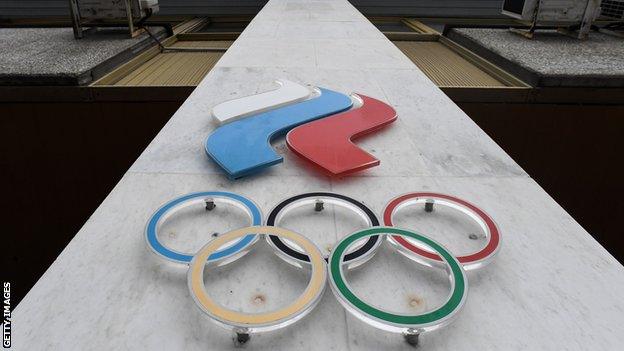Russia doping ban: Vicki Aggar considered quitting Wada role over Rusada reinstatement
- Published

Russia was banned over alleged state-sponsored doping, including at the 2014 Winter Olympics in Sochi
British former Paralympic rower Vicki Aggar says she considered resigning from the World Anti-Doping Agency athlete committee after Russia's anti-doping body was reinstated.
Rusada's three-year ban, which followed a major scandal over alleged state-backed doping, was lifted on Thursday.
"It marked one of the worst days in the history of sport," said Aggar, chair of the British Athletes Commission.
However, she said quitting her Wada role would be "admitting defeat".
"My heart has told me that I should resign but my head tells me I must fight on," she told BBC Sport.
"Fight from within to overhaul the Wada that is in such desperate need of reform if it is ever to restore the lost confidence of sports lovers worldwide."
Canadian Olympic cross-country skiing champion Beckie Scott resigned in protest from Wada's compliance review committee (CRC) after it recommended Rusada's reinstatement last week, but will remain as chair of the athlete committee.
Aggar had previously said Wada "wanted Russia back at any cost" after the BBC revealed the body had proposed a compromise to Russia that would allow the suspension to be lifted.
"It was without doubt the most devastating day in the history of anti-doping," said Aggar on Friday.
"And it's no exaggeration to say that in many ways the decision Wada made sounded the death knell for the anti-doping movement as we know it."
Leading athletes and anti-doping bodies from around the world have also opposed Wada's move.
"Given the significance of the decision, and from speaking to athletes across Britain and the world, it's safe to say that anti-doping will never be quite the same," added Aggar.
Ukad CEO 'incredibly saddened' by Wada's decision to reinstate Rusada
Rusada was suspended in 2015 over alleged state-sponsored doping after it was accused of covering up drug abuse - including while the country hosted the 2014 Sochi Winter Olympics - in a Wada-commissioned report.
Russia was initially ordered to meet set criteria before Rusada could be readmitted, which included accepting the findings of the McLaren report and granting access to Moscow's anti-doping laboratory.
Wada president Sir Craig Reedie said the reinstatement was "subject to strict conditions".
"This decision provides a clear timeline by which Wada must be given access to the former Moscow laboratory data and samples," said the Briton.
Wada's compliance review committee recommended Rusada's reinstatement after it received assurances from the Russian sports ministry, saying the country had "sufficiently acknowledged" failures.
CRC chair and British lawyer Jonathan Taylor said the committee now had a "written commitment" from Russian sports minister Pavel Kolobkov to "provide access to the analytical instruments, to an independent expert and to take the data directly from those instruments".
He added: "That means we can be assured that is the data from the instruments, and that can then be reviewed and it can be determined whether or not there is a case to answer.
"And if samples need to be reanalysed as part of that process, then there is also a commitment to provide them.
"As a post-resinstatement condition, they must provide the data by the end of the year, and must provide the samples within six months of that."
Russia has repeatedly denied running a state-sponsored doping programme and continued to deny full access to and retained control of its Moscow laboratory.